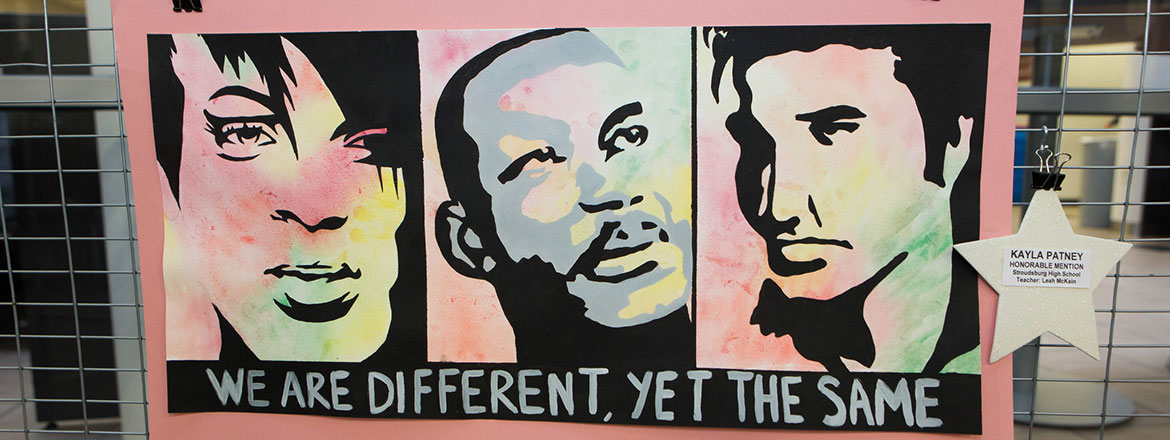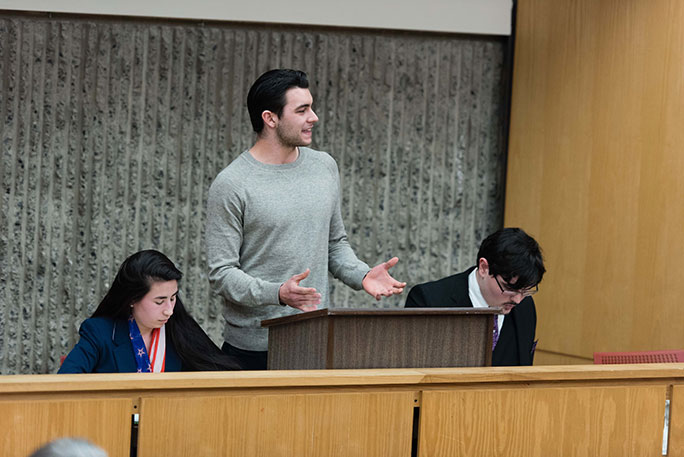
First Amendment
As a public university, ESU is committed to the ideals of free speech protected by the First Amendment.
Freedom of speech is not only an important individual right, but also essential to a healthy democracy.
Can ESU limit free speech?
Generally speaking, under the First Amendment, an individual can exercise their freedom of speech rights to express their opinions publicly without government interference. However, the First Amendment does limit government entities like ESU, but not private entities such as businesses, organizations, private schools, or private individuals. Public universities like ESU, which are created by state governments, are considered governmental entities, and therefore cannot limit the speech rights of students.
Why is free speech important on a campus like ESU?
A university like ESU exists to educate students and advance their critical thinking skills by acting as a “marketplace of ideas” where ideas compete. This competition of ideas is necessary and critical to maintain the intellectual vitality of the university. Without protected free speech, students and faculty members may fear punishment for expressing unpopular views with the public at large or fear of reprimand by university administrators.
 In a democracy, everyone has freedom of speech. At times, that may mean exposure to
mean-spirited, offensive, disparaging, hateful, hurtful, and even angering comments.
This often creates confusion because it seems unfair and completely wrong that the
First Amendment protects offensive speech. Freedom of speech is meant to protect everyone
because it is neutral. Because someone has the right to express their ideas – even
if some find their ideas offensive, hateful, repulsive, hurtful, and wrong, it means
everyone’s right to express ideas is protected.
In a democracy, everyone has freedom of speech. At times, that may mean exposure to
mean-spirited, offensive, disparaging, hateful, hurtful, and even angering comments.
This often creates confusion because it seems unfair and completely wrong that the
First Amendment protects offensive speech. Freedom of speech is meant to protect everyone
because it is neutral. Because someone has the right to express their ideas – even
if some find their ideas offensive, hateful, repulsive, hurtful, and wrong, it means
everyone’s right to express ideas is protected.
Offensive words and statements may trigger emotions that are real, raw, and deep when these words and statements are embedded in historically oppressive, violent, and white supremacist systems. However, when speech begins to be limited, you don’t know where that limitation ends. The answer to offensive speech is not less speech, it is more speech.
What are some free speech protections and limitations on campus?
- Disruptive Activity: Any act that unreasonably interferes with the rights of others to peaceably assemble or to exercise the right of free speech, disrupts the normal functioning of the University, damages property, or endangers health or safety is specifically prohibited.
- Reasonable Access: The University is required by law to provide and maintain reasonable access to, and exit from any office, classroom, laboratory, or building. This access must not be obstructed at any time.
- Symbolic Protest: Displaying a sign, gesturing, wearing symbolic clothing, or otherwise protesting silently is permissible unless it is a disruptive activity or impedes access to facilities. In addition, such acts should not block the audience’s view or prevent the audience from being able to pay attention to a lawful assembly and/or an official University event.
Since ESU is a government entity (as part of the Pennsylvania State System of Higher Education), we are barred by the Constitution from limiting or addressing speech outside of the above limitations. All government entities can propose limits on speech – limit the time, place, or manner in which they occur; however, they must be content-neutral. Government entities cannot impose limitations on speech because some people do not like it. The content, or point of view, cannot matter.
How do we balance potential conflicts between social justice and free speech?
From a social justice lens, some questions raised about free speech may include:
- How does the First Amendment right to free speech apply to hateful language?
-
Under the First Amendment’s protection for freedom of expression, there is no exception for hate speech, unless the speech is direct, personal, targeted, and either truly threatening or violently provocative. The First Amendment to the Constitution protects speech no matter how offensive its content.
- What does freedom of speech protect?
-
The First Amendment guarantees the right to express ideas and information. It protects people’s views and opinions, even when they are unpopular and offensive and may cause discomfort or emotional pain.
- Can ESU deny admission to a student who expresses hateful views?
-
As a public university, ESU cannot deny admission on the grounds of hateful speech because hate speech is protected under the First Amendment.
- Can ESU deny campus entry to people preaching hate like racism and homophobia?
-
As a public university, ESU cannot exclude speakers based on their political or personal views. The First Amendment prevents public institutions from censoring protected speech. The University has designated public forums on University property for this type of speech.
- Which types of speech are not protected under the First Amendment?
-
The First Amendment protects hate speech unless the speech is direct, personal, and either truly threatening or violently provocative to incite some type of lawless action.
- What about nonverbal symbols, like swastikas and burning crosses? Are they constitutionally protected?
-
Symbols of hate are generally protected “speech” if they are worn or displayed before an audience in a public space. However, the First Amendment does not protect the use of these symbols to directly threaten or violently provoke an individual, such as hanging a noose over a student’s residence hall room.
- Why does the University defend free speech rights of White supremacists, misogynists, homophobes, transphobes, and other bigots? Would not restricting their speech send a strong message on hate speech on campus?
-
The First Amendment makes free speech rights that are indivisible. Restricting the speech of one group or individual jeopardizes everyone’s rights because the same restrictions used to silence these individuals can be used to silence you.
- What can I do as a student to support diversity, equity, and inclusion on campus?
-
- Speak loudly and clearly against expressions of racist, sexist, homophobic, and transphobic speech, as well as other instances of discrimination against marginalized individuals or groups.
- React promptly and firmly to counter acts of discriminatory harassment, discrimination, or intimidation.
- Create forums and workshops to raise awareness and promote dialogue on issues of race, sex, sexual orientation, and gender identity.
- Intensify efforts to ensure broad diversity among the student body, throughout the faculty, and within the college administration.
- Vigilantly defend the equal rights of all speakers and all ideas to be heard, and promote a climate of courageous and uninhibited dialogue and debate open to all views, no matter how controversial.
East Stroudsburg University is committed to diversity, equity, and inclusion.
As Warriors and Champions of Social Justice, each of you can challenge racism, sexism, homophobia, transphobia, stereotypes, and toxic language wherever you go: in dining halls, residence halls, student organization meetings, locker rooms, athletic fields, and in the stands.
Get involved on campus to affect change. This is part of how we create a welcoming and inclusive campus – by getting involved and speaking up.
Civic Engagement
Civic engagement, or civic participation, involves working to make a difference in a particular community or in society at large. Here is a short list of clubs and organizations that practice civic engagement. For more information, contact the Student Activity Association.
- Black Student Union
- College Democrats
- College Republicans
- Feminist Alliance
- National Council of Negro Women
- Pride
- Sociology, Social Work & Criminal Justice
- Stroud Courier
- Student Government Association
- WESS Radio
Contact Us
Contact Information
- Campus Address
- Reibman Administration Building
- Phone:
- (570) 422-3463
- Fax:
- (570) 422-3410 (Fax)
- Title of Department Leader
- Vice President, Campus Life and Inclusive Excellence
- Name
- Santiago Solis



